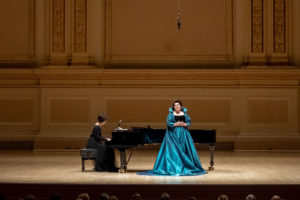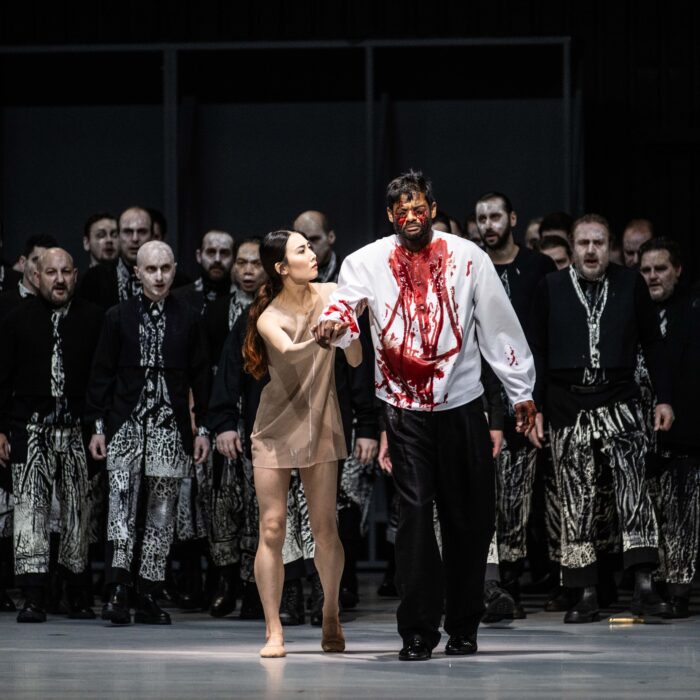
Carnegie Hall 2019-20 Review: Hibla Gerzmava In Recital
Russian Soprano Delivers A Potent Performance Despite Controversy & Distractions
By Chris RuelStar Russian soprano Hibla Gerzmava performed a recital program featuring art song compositions by Glinka, Rimsky-Korsakov, and Prokofiev sprinkled with a dramatic dash of Donizetti and Verdi on Nov. 1, 2019 at Carnegie Hall.
Her appearance was not without controversy. To get to the main entrance, recital-goers needed to push past Pro-Ukrainian activists lining the sidewalk and holding placards in protest of the performance.
According to a June 2017 Boston Globe article, Gerzmava and conductor Vladimir Spivakov faced protests outside a concert at Emerson College’s Cutler Majestic Theatre. The controversy arose out of a 2014 letter signed by over 500 Russian cultural figures—Gerzmava included—voicing support for President Vladimir Putin’s policies toward Ukraine.
The protest outside Carnegie Hall was not easily ignored or forgotten; but; when all was sang and done, Gerzmava gave a highly memorable performance to an adoring crowd. The evening was not without blemishes; however, these had nothing to do with Gerzmava or the protest.
No Text & Some Distractions
While extensive program notes provided strong contextual/musicological information, the absence of translation presented a tall obstacle. While I’m not a believer in having one’s nose buried in a program as an artist works their magic onstage—they deserve the audience’s full attention—but barriers to entry to classical music, and classical singing, in particular, need to be lowered, not raised.
Program notes are not a substitute for the text. If fostering an audience of classical singing fans is to be encouraged, then they need to be given a toehold. Access to the text in translation during a performance is key; otherwise, it feels like a completely inaccessible art form intended for the cognoscenti only.
Then there was the issue of cellphones.
This past September, in Ohio’s Cincinnati Music Hall, violin virtuoso Anne-Sophie Mutter hit the breaks mid-performance and directed her displeasure at an audience member who was recording on their device. It was a distraction and she wanted it to stop.
The ushers at Carnegie Hall are super-diligent in spotting cellphone usage during a show, and there was plenty of work to keep them busy.
Since the ushers are charged to police such behavior, there were very few moments during the performance when there wasn’t an usher, or multiple ushers, making their way up and down the aisles, telling people to put their devices away. All of it was highly distracting and deleterious to the overall experience.
I must believe that it was distracting to Gerzmava and her accompanist, Ekaterina Ganelina, as well. Such are the times in which we live. Perhaps, it was the star power of Gerzmava that prompted the outbreak of not-so-surreptitious recording and photography, but it was the first time I had witnessed such a pitched battle of whack-a-mole as phones kept popping up and ushers kept swatting them down.
The Big Moments
Protests, lack of text in translation, and cellphone nonsense aside, Gerzmava served up excellent music for which she deserves praise, and the most thrilling selections of the evening came from the operatic repertoire placed within the final set of the 20-plus song performance.
So, I’ll begin with the end where jaw-dropping moments were on display with Donizetti’s “Piangete voi…Al dolce guidami…Coppola iniqua” from Act two of “Anna Bolena;” “Pace, pace mio Dio” from Act four of Verdi’s “La Forza Del Destino;” and, a second Verdi piece, “Tacea la notte,” Leonora’s aria from “Il Trovatore.” Gerzmava brought her A-game to these well-known arias, as she should. These are works she’s performed in staged productions at La Scala and Zurich, as well as in concert format, so one would expect the level of artistry she displayed.
Stuck in between the Donizetti and Verdi arias were Reynaldo Hahn’s “Á Chloris” and Gabriel Fauré’s “Après un rêve,” and “La papillons et la fleur.” While “Á Chloris’ and ‘Après un rêve” provided a dreamy interlude, it was jarring to go from the wild madness of “Piangete voi,” a selection that demonstrated Gerzmava’s credentials as a top-rated lyric soprano, to more subdued fare. As beautifully sung as “Á Chloris” and “Après un rêve” were, they felt ill-placed in the program. Had Fauré’s “La papillons et la fleur” been bumped up to start the set, placing it ahead of Donizetti’s “Piangete voi,” the piece would have been a playful apéritif leading to a stunning main course.
Gerzmava shone brightly with “Piangete voi,” flying into the stratosphere with ease and grace and exhilarating power. Throughout the evening, she demonstrated command of both her lower and upper registers in stunning fashion with flawless evenness of timbre moving through the passaggio. If you’re looking for the highlight of the evening, “Piangete voi” was it.
The two Verdi selections were of similar high quality. “Pace, pace mio Dio” requires the heft of the lower register to carry the text’s weight as well as upper register rocket fuel to blast skyward. Gerzmava had both. Her “Tacea la notte” rounded the out three pieces with its memorable cabaletta.
The crowd ate up the three operatic numbers with a spoon; these were “give me more!” moments that passed too quickly and were interrupted by “Á Chloris’ and ‘Après un rêve.” As beautiful as those pieces are, the styles just didn’t mesh well with the Donizetti and Verdi.
Russian Repertoire
Preceding the closing operatic fireworks were five pieces by Glinka, three by Rimsky-Korsakov, and a series of five poems by the acclaimed 20th-century Russian poet Anna Akhmatova set to music by Prokofiev. All were beautifully sung, but here is where translations of the texts—or lack thereof—came into play.
The 13 pieces by Russian composers were all over the map in terms of subject matter, musicality, and drama; yet, so much was missed through the inability to take a quick glance downward and get a full understanding of what Gerzmava was so beautifully expressing through her voice, presence, and dramatics. Due to the absence of the text in translation, there was a sense of being left out, particularly in a predominantly Russian-speaking crowd.
Of the five Glinka selections, two stood out.
“The Fire of Longing” is a bouncy, playful waltz with strong movement in the piano that keeps the song moving forward. Gerzmava’s expressiveness was on fine display and, it was with this selection where I first noted her crystalline ascent into her upper register. When Gerzmava kicks it high, look out, because she will throttle your senses with its potency. Yet, none of her power overshadowed the nuances of much of the Russian repertoire.
Later in the Glinka set, the audience was transported to Venice. Glinka paid a visit to the city in 1833 but unfortunately took ill. It wasn’t an enjoyable time for the maestro; however, “Venetian Night,” penned prior to the composer’s health issues, showcased his ability to write in the Italian style with the music representing the locale very clearly. Gerzmava’s lusciously languid floating along the vocal line inspired images of the canals of La Serenissima.
“I Am Here, Inezilia,” was a sprightly serenade and Gerzmava’s teaser for the three operatic showcases. The song had a jaunty piano line while Gerzmava bounced about the staff with absolute confidence, throwing in seemingly effortless embellishments.
The following set featured three Rimsky-Korsakov selections: “Not the Wind, Blowing From the Heights;” “The Clouds Begin to Scatter;” and, “The Lark’s Song.”
“Not the Wind,” the text of which was written by Aleksey Tolstoy, the half-cousin of Leo, began as a wonderfully soothing piece with the poem speaking of love and the soul. Storms arise toward the middle and the serenity is broken before the comforting framing section returns. Gerzmava approached the piece much like that of “Venetian Night,” taking the song at a slow, seductive pace, infusing it with the right amount of breathiness to represent both the gentle wind and the spirit of the lovers.
Gerzmava returned to the heights with the “The Clouds Begin to Scatter.” As accompanist Ekaterina Ganelina ran slow arpeggiated chords, Gerzmava climbed upward to the stars and back in beautiful arcing lines. As the piece neared its conclusion, the pace picked up and the melody progressed into a darker ambiance before once more requiring Gerzmava to leap high where the song came to rest in the cloudless night.
The final set of Russian compositions were written by Prokofiev and consisted of five songs with text by Anna Akhmatova.
Akhmatova is considered a giant among Russia’s “Silver Age” poets. The writer survived years of repression under Stalin, the death of her husband, detention of her son, and a ban on the printing of her poems. Her “Requiem” captures much of the upheaval that occurred in the 20th century from revolution to political terror and war. In particular, she put to words the terrible sight of hundreds of women lining up daily at the front door of KGB headquarters, determined to discover the fate of their loved ones. The subject matter ranged from love affairs to ghosts and each had their moments, but it was at that this point, my head, unable to suck the textual marrow out of all the preceding pieces, was ready for the vocal extravaganza to come.
I didn’t leave the hall disappointed —in the high quality of the singing at least. Gerzmava exuded confidence, remained non-plussed by the constant movement in the auditorium, and basked in the well-deserved accolades bestowed upon her by those in the seats, finishing the evening with “Travushka-Muravushka,” a Russian folksong as her second encore.
The audience clapped joyfully to the beat as Gerzmava blew kisses toward her fans in the boxes, finishing the night on a playful note.



